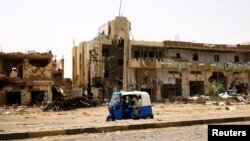Many fear conflict could return in Sudan, with the expiration of a 72-hour cease-fire. Limited humanitarian assistance during the calm and the evacuation of many foreign nationals left many hoping that the temporary agreement could be extended into meaningful talks for peace.
Sudan’s ambassador to the U.S., Mohammed Abdullah Idris, who spoke with VOA recently, says peace will prevail if all parties respect the terms of the truce.
"We hope that the other party will respect the truce and will respect the cease-fire," he said, "and especially those elements of the RSF [Rapid Support forces], those [that] are deployed in residential areas and on our roads, streets, [and] intersections. So as far as the government is concerned, I would like to assure you that we are committed to respect the cease-fire."
Ambassador Abdullah, who was appointed by the current military-led government, expressed confidence in the mediation efforts initiated by the African Union and the regional security organization, the Intergovernmental Authority on Development, or IGAD. The heads of South Sudan, Djibouti and Kenya are expected to spearhead the negotiations for peace.
"The hope is for peace ... as we are speaking now and in the future," said Abdullah. "The Africa Union or the IGAD delegation of three Presidents was intending to visit Sudan. [So], the opportunity is there, but due to technical problems, the airport is closed now, and so it’s not possible for them to fly to Khartoum."
The U.S. Secretary of State Antony Blinken said Washington is in direct talks with the two warring factions, namely, Sudanese army Gen. Abdel Fattah al-Burhan and the head of the Rapid Support Forces, Gen. Mohamed Hamdan Daglo, or "Hemedti."
"We've also continued to engage directly with Gen. al-Burhan to press them to extend and expand the Eid cease-fire to a sustainable cessation of hostilities that prevents further violence and upholds humanitarian obligations," said Blinken. "The Sudanese people are not giving up on their aspirations for a secure, free and democratic future. Neither will we."
Former Sudanese ambassador to the U.S., Nureldin Satti, who also spoke with VOA, hopes the temporary truce will lead to a permanent peace and pave the way to a democratically elected government. He, however, blames the Sudanese army for failing to address the expansion of the Rapid Support Forces.
"It was their own making," said Satti. "They are the ones that created the RSF. Until 10 or 11 days ago they were their partners. And they allowed them to come to Khartoum. They allowed them to amass a fortune. They allowed them to make themselves even more powerful than the army. They allowed them to even occupy army locations around Khartoum."
Ambassador Abdullah agrees that the conflict could have been avoided, but says going forward, the government is committed to lasting peace.
"The government [and] the chairman of [Sudan governing] Sovereign Supreme Council have reiterated it once and many times that the government is committed to the resumption of the political process, and the political process should also lead to a civilian government that could lead it to a transition," he said.
IGAD and many international partners have proposed extending the cease-fire, but is not clear if an extended truce can be reached.
According to Agence France-Presse, Sudan’s health ministry says at least 512 people have been killed and 4,193 wounded in the fighting.
VOA's John Tanza contributed to this report.






![Sudan US Ambassador: Government Committed to Civilian Transition [5:48]](https://gdb.voanews.com/01000000-0aff-0242-3f51-08db46a35b99_w33_r1.jpg)


